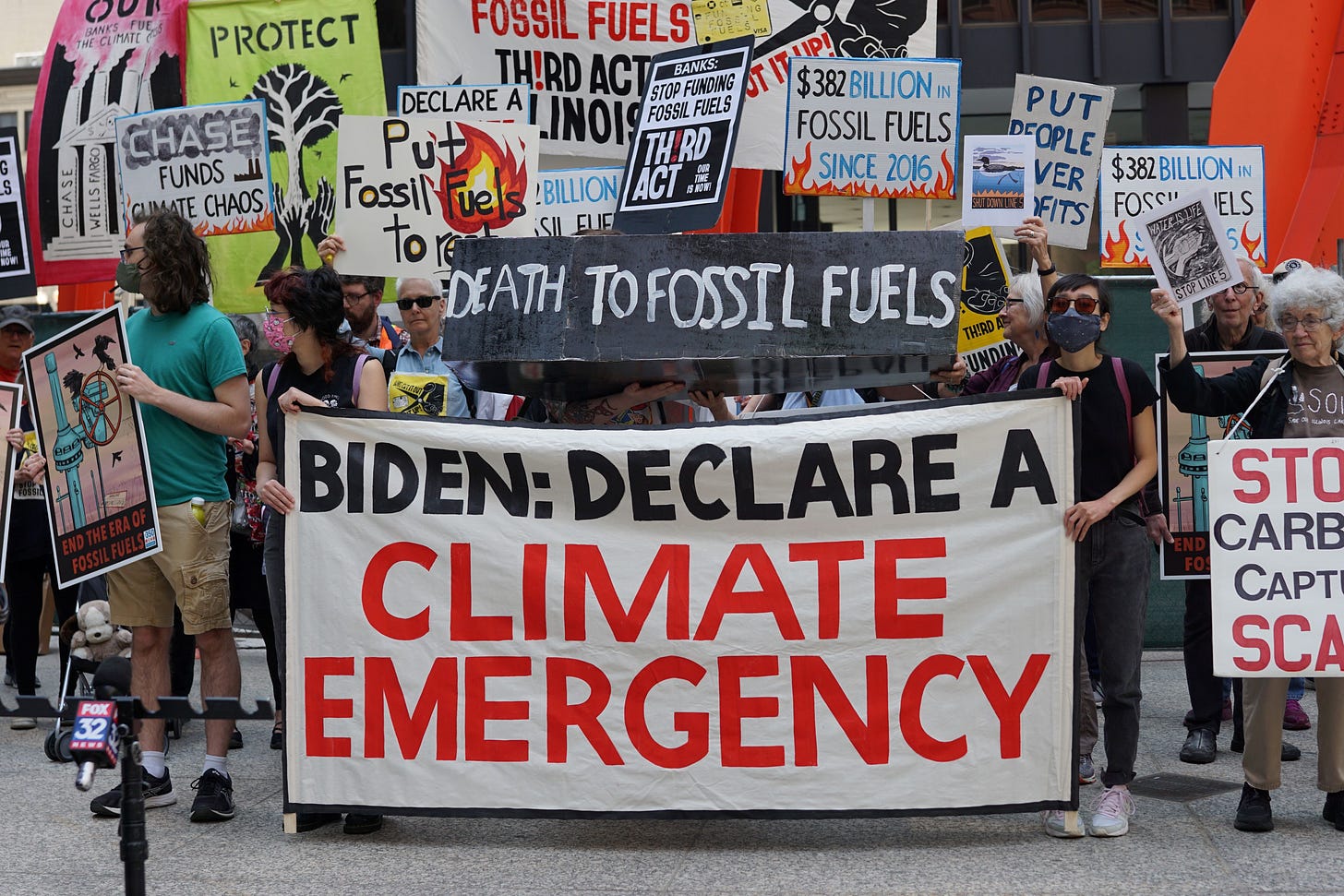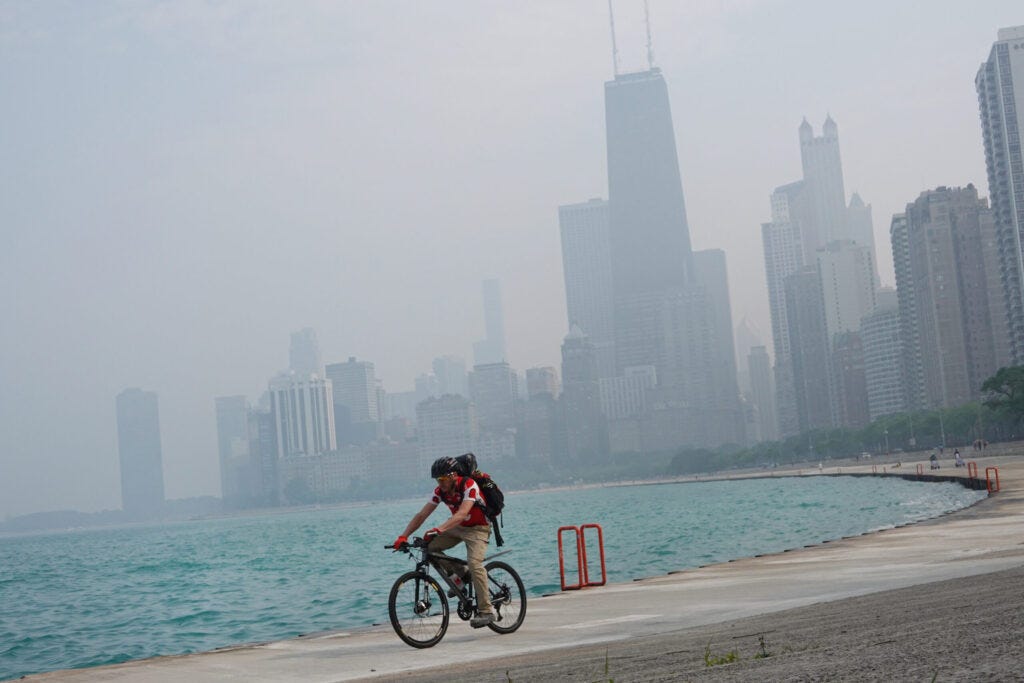Conservative Climate Activist Bob Inglis to Speak in Chicago
Former GOP Congressman first speaker for Chicago 350's Monthly Speakers Series in a webinar entitled "Free Enterprise Solution to Climate Change."
IN BRIEF
Register Now for One of the Most Unique Climate Talks You’ll Ever Hear!
Former GOP Congressman Bob Inglis will be speaking on 7/19 7pm on Republicans and climate change in a webinar entitled “A Free-Enterprise Solution to Climate Change.” Bob Inglis won the JFK Profiles in Courage award for standing up and speaking climate truth to power, and losing his job and his power in the process. This is the first in our new Monthly Speaker series. Join us! And spread the word, particularly to our friends on the right side of the aisle. REGISTER HERE!
Climate & Equitable Jobs Act Networking Fairs
The Dept. of Commerce and Economic Opportunity is sponsoring regional networking fairs, so clean energy employers, organizations interested in applying for funding to deliver one of the CEJA workforce programs, can connect growing the clean energy workforce in various IL regions! For registration and more information about all of the CEJA programs see the CEJA Implementation page.
350 Chicago, People vs. Fossil Fuels Rally in July 9th Protest
On Friday, June 9th 2023, a coalition of climate fighting groups gathered in Chicago to demand that President Biden Declare a Climate Emergency and End the Era of Fossil Fuels! During our action, 350 Chicago was joined by members of Extinction Rebellion, Rising Tide Chicago, Third Act, Fridays for Future, The Illinois Green Party, Climate Reality Project, Chicago Climate Youth Coalition, Chicago Area Peace Action, 350 Milwaukee, Nuclear Energy Information Service, WeCan International, Illinois PIRG, Sierra Club. We also pressed Biden to shut down the Line 5 oil and gas pipeline in the Great Lakes Basin. If a rupture were to occur in the 70-year old decrepit pipeline, the livelihood of Indigenous Tribes around Lake Superior could be destroyed while threatening the drinking water of millions in the basin. Furthermore, we called on Chase bank to halt their destructive financing of fossil fuels, and Peoples Gas to stop their immoral rate hike on Chicago consumers to pay for their cost overruns! To stop the worst effects of the climate crisis we have to stop new fossil fuel projects NOW, hasten the transition under the Inflation Reduction Act, and bring justice to the communities most impacted by fossil fuels. People across the country are fighting locally against oil and gas developments: Our fight for climate justice is connected, and President Biden has the responsibility and power to act now.
* Scroll to the bottom for upcoming events.
MAIN STORIES
Chicago, Canadian Wildfires, and Climate Change
by Josh Horwitz, 7/9
/23
Chicago is associated with many things: wind, cold weather, Lake Michigan, hot dogs, and thick crust pizza. But “wildfires” are not typically put at the top of that list. However, this past Tuesday June 26th, Chicago residents could both smell and feel the thick haze in the air: a smog so bad that for a time Chicago had the worst air quality of any major city in the world. The immediate cause of this spike in poor air quality was the Canadian Wildfires, which have been plaguing the air quality of Canada for months and has already affected multiple American cities such as New York City and Washington DC.
The terrible air quality has led to closings a of beaches, 100 canceled flights just on Tuesday, canceling of activities at day camps and parks and air quality warnings have urged people to stay inside. The air quality is particularly bad for those with respiratory conditions, the elderly, and children, but at these levels the air quality is unhealthy for everyone.
There is no question that climate change is only making these wildfires worse, and more common. The BBC looked into whether climate change could be attributed to these wildfires specifically, and while the source of any particular wildfire is complicated to pin down, there is a “clear connection” between the increased effects of global warming and the increases in wildfires. The latest IPCC Report has found that wildfires are both an effect of global warming and a trigger of it, as the fires destroy carbon sinks thereby reducing our ability to mitigate climate change.
So let these wildfires be a warning: climate change is not just a problem in places far away; it is affecting us here and now, in dangerous ways we have not experienced before. But there are actions we can take in Chicago to reduce greenhouse gas emissions and improve our own air quality. While this particular brand of air pollution is new to Chicago, our poor air quality has been an ongoing concern in this city as this newsletter reported previously. Citations for polluters have been woefully inadequate ever since mayor Emanuel disbanded Chicago’s Department of Environment, replacing it with the under-funded and under-resourced “Office of Sustainability”. Not only does this lax enforcement allow air pollution to endanger our communities – especially communities of color – it also allows polluters to continue emitting excess amounts of greenhouse gasses, which contributes to these harmful ripple effects throughout the planet. While mayor Johnson has promised to “Resurrect and Improve” the Department of Environment, it remains to be seen whether he will live up to this promise. As Chicagoans, we should ensure this is a priority for him and his administration, both for our sakes, and for the entire living biosphere.
How to Get Republicans Onside with Climate Action
by Abby, 7/9/23
Hi everybody, I’m Abby. I am a social science researcher and educator, proud 350 Chicago member and creator of the educational YouTube channel Political Psych with Abby. This is the first installment of what will hopefully be an ongoing series on how we can use insights from psychology and social science to improve climate activism.
Now I will admit that I am pretty left wing and have some fundamental disagreements with conservatism generally, but climate change should not be a partisan issue and we simply cannot afford to have large sectors of the population opposed to climate action. Social scientists have proposed several solutions to persuade conservatives of the need for climate action. One promising method that has been tested is to design messaging specifically to appeal to conservative values and identity.
For example, I was thrilled to see a Nature article titled “Shifting Republican Views on Climate Change through Targeted Advertising” by Golberg, Gustafsen, Rosenthal and Leiserowitz. The study even involves Bob Inglis, the very person who is coming to speak to us! I was even happier to see that they found his messaging effective. In this study, videos featuring people likely to connect with conservatives like Bob Inglis, a retired general and a climate scientist who is also an Evangelical Christian, were shown to people who did not feel strongly one way or the other about climate change. Another similar group was not shown these videos and they served as the control. According to Goldberg, et. al. “Among Republicans, the campaign resulted in a 7-percentage-point increase in belief that global warming is happening, a 10-point increase in understanding that global warming is human caused, an 11-point increase in global warming issue importance, a 13-point increase in worry about global warming, a 12-point increase in perceptions of personal harm, and a 16-point increase in perceptions of harm to future generations.” They also found that the campaign was persuasive for others who did not specifically identify as Republicans.
Persuading conservatives to this degree is significant as it could create greater and more bipartisan political force behind necessary policy change to address the climate crisis. I do want to caution people that this work was only done in a specific geographic context (two competitive congressional districts in Missouri and Georgia) and that a change in beliefs about the environment does not always result in more pro-environmental action. Still, this article should be a source of hope that many conservatives are reachable on this existential crisis. It should also be a call to action to get more conservatives involved with the movement, especially because they have a special ability to bring their fellow conservatives with them. Long story short I am now very excited for Bob Inglis’s talk and you should be too!
Top 10% of Population Likely to Absorb Largest Losses from Fossil Fuel Assets
by Madeline Puffenbarger, 7/9/23
As our community works to combat the effects of climate change, our society’s dependence on fossil fuels, unfortunately, still remains strong. A common concern surrounding green energy is if we shift too quickly towards renewables, then fossil fuel valuations in financial markets could decrease significantly, leading to market volatility and poor performance in retirement accounts across the broader population. While some people worry that divesting from oil and gas names in retirement portfolios will reduce overall performance, people that remain invested in these names will likely be exposed to the market risk of stranded assets.
A new study published in Joule explored the financial impacts of these stranded assets, defined as assets that have experienced an unanticipated loss, likely from shutting down fossil fuel sites before reserves are depleted. The study found that the top 10% of the population in wealthy nations should absorb a large portion of the financial losses resulting from fossil fuel stranded assets. This study evaluated six wealthy nations (including the United States), to estimate the impact distribution from stranded assets across income levels. In the U.S., the study concluded that only 3.5% of an estimated $350 billion in stranded assets should impact the poorest half of the nation. The top 10% should feel the greatest impact, absorbing two-thirds of the losses (split roughly equally between the top 1% and top 9%). The other five countries follow similar distributions as the U.S., and, importantly, the researchers from the Joule study found that stranded assets will represent less than one percent of the net wealth of the top 1%.
Therefore, the study provides early evidence that concerns for pension and retirement losses should not dissuade countries from implementing important climate policies. More information can be found in the Joule study or from BBC. Additionally, if you are concerned about your own exposure to fossil fuels, divestment from these companies is possible in many retirement portfolios. 350 Chicago provides more information, including individual divestment resources here.









